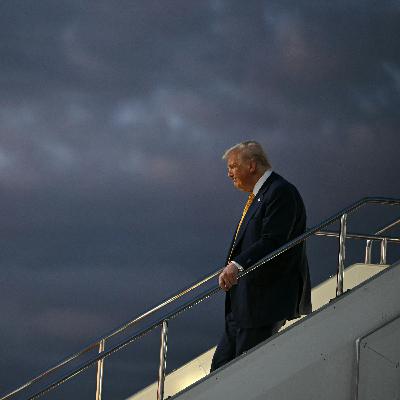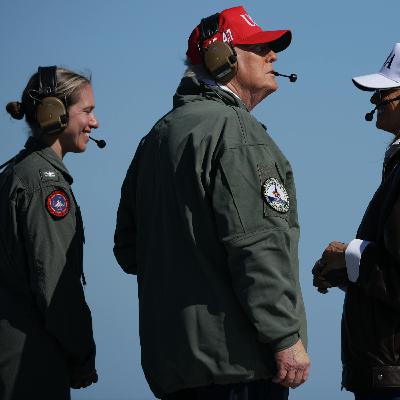Discover Foreign Policy Live
Foreign Policy Live

Foreign Policy Live
Author: Foreign Policy
Subscribed: 9,507Played: 182,790Subscribe
Share
© 062646. Copyright 2021, Foreign Policy/The Slate Group LLC, a Graham Holdings company. All rights reserved.
Description
Each week, Foreign Policy Live will feature a substantive conversation on world affairs. Host and FP editor in chief Ravi Agrawal will be joined by leading foreign-policy thinkers and practitioners to analyze a key issue in global politics, from the U.S.-China relationship to conflict and diplomacy. FP Live is your weekly fix for smart thinking about the world.
Foreign Policy magazine subscribers can watch these interviews live and submit questions and suggestions by going to https://foreignpolicy.com/live/.
201 Episodes
Reverse
FP’s Ravi Agrawal sits down with Greek Prime Minister Kyriakos Mitsotakis to discuss NATO, a shifting European defense strategy, and more.
Plus, One Thing from Ravi on the rising nuclear threat.
Ravi Agrawal: Greek PM: ‘I haven’t given up on the trans-Atlantic relationship.’
Stavros Papastavrou: The Trans-Atlantic Energy Relationship Is Stronger Than Ever
Kristi Raik: Europe’s 4 Different Ways of Handling Trump
Luke McGee: Europe Is Prepared to Create Its Own Army
Stephen M. Walt: NATO’s Leader is Totally Lost
Rebecca Lissner and Erin D. Dumbacher: The Pillars of the Global Nuclear Order Are Cracking
Learn more about your ad choices. Visit megaphone.fm/adchoices
U.S. President Donald Trump’s pursuit of Greenland has brought a geopolitical hot spot—the Arctic—back into the fore. Host Ravi Agrawal is joined by Heather A. Conley, one of the leading experts on the region, to hear more.
Plus, One Thing from Ravi on China’s latest military purge.
Casey Michel: Annexing Greenland Would Be a Strategic Catastrophe
Imran Bayoumi: Trump’s Greenland Threats Paper Over a Lack of Arctic Strategy
Christina Lu: Greenland’s Rare Earths Aren’t All That
Stephen M. Walt: What Spheres of Influence Are—and Aren’t
Michele Barbero: To Protect Greenland, Europe Kicks Into High Gear
Deng Yuwen: As Generals Fall, Xi Jinping’s Anti-Corruption Campaign Is Eating Itself
Learn more about your ad choices. Visit megaphone.fm/adchoices
Host Ravi Agrawal is joined by world leaders and industry executives on the sidelines of the World Economic Forum in Davos, Switzerland. The panelists include Bandar Alkhorayef, Saudi Arabia’s minister of industry and mineral resources; Jonathan Price, the president and CEO of Teck Resources; Boitumelo Mosako of the Development Bank of Southern Africa; and SandboxAQ’s Jack Hidary.
Plus, One Thing from Ravi on dueling speeches by U.S. President Donald Trump and Canadian Prime Minister Mark Carney.
Ravi Agrawal: In Davos, a Tale of Two Speeches
Transcript: Trump Says He ‘Won’t Use Force’ to Acquire Greenland
Transcript: ‘A Rupture in the World Order’
Learn more about your ad choices. Visit megaphone.fm/adchoices
What is driving U.S. President Donald Trump’s foreign policy in his second term? Eurasia Group President Ian Bremmer says it is the “law of the jungle ... it’s always been about power.” Bremmer sits down with Ravi Agrawal to share his assessment of Trump 2.0 and what the coming months could look like.
Plus, Ravi’s One Thing on U.S universities and immigration.
New York Times: Chinese Universities Surge in Global Rankings as U.S. Schools Slip
Steven A. Cook: Faulty Assumptions About Iran Have Driven a Failed U.S. Policy
Marc Lynch: Why a U.S. Attack on Iran Would Backfire
A. Wess Mitchell: The Grand Strategy Behind Trump’s Foreign Policy
Oliver Stuenkel: The EU-Mercosur Deal Is a Hedge Against the Donroe Doctrine
The Atlantic: Is the Iranian Regime About to Collapse?
Learn more about your ad choices. Visit megaphone.fm/adchoices
What comes next after U.S. President Donald Trump’s shocking capture of Venezuelan President Nicolás Maduro? Does Trump have a day-after plan? Most experts say no. But FP columnist Matthew Kroenig disagrees, arguing in a recent piece for Foreign Policy that a plan is coming into focus. He shares his take with Ravi Agrawal.
Plus Ravi’s One Thing on the nationwide protests in Iran.
Alireza Nader and Nik Kowsar: Iran’s Currency Crisis Could Be the Regime’s Downfall
Matthew Kroenig: Trump Has a Strategy for Venezuela
Matthew Kroenig: Two Cheers for the National Security Strategy
Matthew Kroenig: Trump Should Oust Maduro
Vasabjit Banerjee and Maria I. Puerta Riera: Venezuela’s Military Won’t Surrender Its Privileges Easily
David Ignatius: Trump Might Have His Hubris Checked in Venezuela
Learn more about your ad choices. Visit megaphone.fm/adchoices
Comfort Ero joins FP Live for her annual analysis of the 10 conflicts to watch this year.
Plus Ravi’s One Thing on the stunning capture of Nicolás Maduro and the future of Venezuela.
Ravi Agrawal: 5 Unanswered Questions About Trump’s Venezuela Plan
Comfort Ero and Richard Atwood: 10 Conflicts to Watch in 2026
Casey Michel: Annexing Greenland Would Be a Strategic Catastrophe
Christopher Sabatini: Trump Has No Real Plan for Venezuela
Emma Ashford: Venezuela Might Be Where Trump’s Luck Runs Out
Jesse Marks: Trump’s Venezuela Attack May Give China Cover on Taiwan
Learn more about your ad choices. Visit megaphone.fm/adchoices
We begin 2026 with a look ahead. New York Times chief White House correspondent Peter Baker joins host Ravi Agrawal to share his take on what’s to come in the new year.
Learn more about your ad choices. Visit megaphone.fm/adchoices
New York Times chief White House correspondent Peter Baker sits down with Ravi Agrawal for a 2025 review. What have we learned from the first year of the Trump administration’s second term? And how have the White House’s foreign-policy choices in particular differed from previous presidencies?
Vanity Fair Exclusive: Susie Wiles, JD Vance, and the “Junkyard Dogs”: The White House Chief of Staff on Trump’s Second Term (Part 1 of 2)
Learn more about your ad choices. Visit megaphone.fm/adchoices
Tensions continue to rise off the coast of Venezuela as U.S. President Donald Trump orders a blockade on sanctioned ships to and from the country. James Story served as the U.S. ambassador in Caracas under both the Trump and Biden administrations, and he shares his predictions on what might happen next.
Plus Ravi’s One Thing on India, Pakistan, and 2025’s great U.S. policy pivot.
Keith Johnson: Trump’s Venezuela Fixation Is Not About the Oil
Alexandra Sharp: Trump Intensifies Pressure Campaign on Venezuela
Emma Ashford and Evan Cooper: Trump Should Stick to His Guns on Venezuela
Learn more about your ad choices. Visit megaphone.fm/adchoices
Is the growth of sovereign wealth funds, especially in the Middle East, transforming geopolitics? Jared Cohen, co-head of the Goldman Sachs Global Institute, sat down with FP’s Ravi Agrawal to discuss why sovereign funds are so pivotal today.
Note: This discussion is part of a series of episodes brought to you by the Goldman Sachs Global Institute.
Jared Cohen and George Lee: The New Wealth of Nations
Learn more about your ad choices. Visit megaphone.fm/adchoices
Former Secretary of State Hillary Clinton sits down with Ravi Agrawal in front of a live audience at the annual Doha Forum in Doha, Qatar. The two discussed the Trump administration’s just-released National Security Strategy, the impacts of U.S. foreign policy around the world, women’s rights, how Democrats can revive their fortunes, and also a controversy over remarks Clinton recently made about why young Americans are shifting their views on Israel.
Plus: Ravi’s One Thing on Trump’s National Security Strategy
Ravi Agrawal: Hillary Clinton: ‘Congress Has Abdicated Its Responsibility’
Rishi Iyengar and Christina Lu: Trump’s New National Security Strategy Goes Full ‘America First’
Nathalie Tocci: Does Europe Finally Realize Its Alone?
Daniel W. Drezner: Foreign-Policy Fantasy Literature
Learn more about your ad choices. Visit megaphone.fm/adchoices
Name a consistent throughline in the Trump administration’s foreign policy. The answer could very well be the global scramble for critical minerals. What are they and why are they so important? Why is China so far ahead and how can the United States catch up? Mining expert Gracelin Baskaran sits down with host Ravi Agrawal to discuss.
Plus Ravi’s One Thing on Trump’s attacks on boats off the coast of Venezuela.
Ravi Agrawal: The Minerals That Drive Trump’s Global Agenda
Christina Lu: Trump’s Chaotic Agenda Has a Critical Through Line
Rishi Iyengar: The Countries Courting Trump With Critical Minerals
Alasdair Phillips-Robins: Xi May Have Miscalculated on Rare Earths
Patrick Schröder: Why Rare Earths Are About to Cost a Lot More
Rachel Oswald: Republicans Criticize Hegseth for Deadly Caribbean Double Strike
Emma Ashford and Evan Cooper: Trump Should Stick to His Guns on Venezuela
Ellen Knickmeyer: U.S.-Led Regime Change Is Usually Disastrous
Keith Johnson: Trump’s Venezuela Fixation Is Not About the Oil
Learn more about your ad choices. Visit megaphone.fm/adchoices
Despite headlines suggesting otherwise, this week’s guest says women’s rights around the world are making real gains. Lyric Thompson, the founder and CEO of the Feminist Foreign Policy Collaborative, sits down with host Ravi Agrawal to share more.
Transcript: The Good News on Women’s Rights
Lyric Thompson: Women’s Rights Are Winning
Rebecca Turkington and Saskia Brechenmacher: Trump Erases Women From Foreign Policy
Hawon Jung: South Korean Women Are Powerful—and Powerless
Learn more about your ad choices. Visit megaphone.fm/adchoices
It’s time for another Ask-Me-Anything edition of FP Live. Executive Producer Dana Sherne puts your questions to host Ravi Agrawal.
Alexandra Sharp: Ramaphosa Capitalizes on Trump’s Absence at G-20 Summit
Christian Caryl: Don’t Call This a ‘Peace Plan’
Rachel Oswald and John Haltiwanger: Trump’s Ukraine Peace Effort Devolves Into Chaos Over Conflicting Stories
Ryan C. Berg: Toppling Maduro Without Boots on the Ground
James Palmer: China-Japan Rift Deepens Over Taiwan
Learn more about your ad choices. Visit megaphone.fm/adchoices
Climate summits such as the ongoing COP30 conference can often seem like a place where countries agree to disagree and little gets done. But Bill McKibben says there’s one key reason for hope: the sun. New advances in panels and battery technology mean solar power will soon provide a growing share of our electricity consumption.
McKibbon is the author of the new book Here Comes the Sun: A Last Chance for the Climate and a Fresh Chance for Civilization.
Plus Ravi’s One Thing on Iran’s water crisis.
Nik Kowsar and Alireza Nader: Tehran’s Residents Are Panicking as the Taps Run Dry
Christina Lu: How China Became a Solar Power
Joseph Rachman and Indra Øverland: A Power-Hungry Southeast Asia Wants China’s Energy
Nigel Pruvis: Will Belém Kill Paris?
Jason Bordoff and Jack Andreasen Cavanaugh: AI’s Rapacious Appetite for Electricity Can Accelerate Clean Energy
Learn more about your ad choices. Visit megaphone.fm/adchoices
As the United States points its biggest warship at Venezuela, what is the White House trying to achieve in Caracas? How does it fit into the Trump administration’s broader Latin America policy? And how is the region responding? Host Ravi Agrawal sits down with scholar Oliver Stuenkel for answers.
Stuenkel is a leading Latin America scholar and senior fellow at the Carnegie Endowment for International Peace.
Plus Ravi’s One Thing on COP30.
FP Columnists: 5 Novelists on Their Favorite Climate Fiction
Oliver Stuenkel and Adrian Feinberg: Milei’s Midterm Miracle
Matthew Kroenig: Trump Should Oust Maduro
Carlos Ruiz-Hernández: The Nostalgic Delusion of 1989
Philip A. Berry: The Use and Abuse of ‘Narco-Terrorism’
John Haltiwanger: Latin America’s Disjointed Reaction to Trump’s Drug Boat War
Geoff Ramsey: What’s the U.S. Endgame in Venezuela?
Ryan C. Berg: Toppling Maduro Without Boots on the Ground
Catherine Osborn: How Migration Became a U.S. Foreign-Policy Priority
Learn more about your ad choices. Visit megaphone.fm/adchoices
China analyst and former policymaker Elizabeth Economy sits down with Ravi Agrawal to unpack the meeting that took place last week between U.S. President Donald Trump and Chinese President Xi Jinping. What was agreed to? What does it mean for the broader trajectory of the world’s most important bilateral relationship?
Plus, Ravi’s One Thing on Trump threatening military action in Nigeria.
Kọ́lá Túbọ̀sún: Why Is Trump Suddenly Talking About Invading Nigeria?
Wall Street Journal: Lingling Wei: China’s New Strategy for Trump: Punch Hard, Concede Little
Rishi Iyengar, Christina Lu, and Keith Johnson: What Trump and Xi Did—and Didn’t—Agree to
James Palmer: Trump and Xi Step Back From the Brink—for Now
Alasdair Phillips-Robins: Xi May Have Miscalculated on Rare Earths
Christina Lu: Will Trump’s Critical Minerals Blitz Pay Off?
Learn more about your ad choices. Visit megaphone.fm/adchoices
Is the AI boom a bubble? What happens if it pops? Economist Jared Bernstein joined FP Live to sound the alarm on the growth and investment in the AI sector.
Plus, Ravi’s One Thing on the first Trump-Xi meeting in six years.
James Palmer: Trump and Xi Step Back From the Brink—for Now
Rishi Iyengar, Christina Lu, and Keith Johnson: What Trump and Xi Did—and Didn’t—Agree To
Sahil Shah: Trump’s Vagueness Over Nuclear Testing Could Fuel an Arms Race
New York Times: Jared Bernstein and Ryan Cummings: Warning: Our Stock Market Is Looking Like a Bubble
Ravi Agrawal: Is the AI Economy a Bubble?
Bhaskar Chakravorti: 10 New AI Challenges—and How to Meet Them
Bhaskar Chakravorti: American AI Is High on Its Own Supply
Brought to you by: quince.com/fplive
Learn more about your ad choices. Visit megaphone.fm/adchoices
How can history help make sense of U.S. President Donald Trump’s foreign policy? Pulitzer Prize-winning author and historian Greg Grandin shares how Trump’s imperialist impulses may be inspired by the country’s Founding Fathers, and that he “rummages around the trash bag of history to find what’s useful at any given moment.”
Plus, Ravi’s One Thing on the recent U.S. sanctions on Russian oil companies.
Keith Johnson: Will Trump’s Russia Oil Sanctions Finally Sway Putin?
Greg Grandin: America, América: A New History of the New World
Ravi Agrawal: Why Trump Is a ‘Scarcity President’
Syrus Solo Jin: With Territory Comes Torment
Stephen M. Walt: Donald Trump Will Never Be a Restrainer
Learn more about your ad choices. Visit megaphone.fm/adchoices
With the cease-fire more than a week old, Palestinians now turn to what comes next: rebuilding and governing. Former spokesperson for the Palestine Liberation Organization Diana Buttu sits down with Ravi Agrawal to share her perspective.
Plus, Ravi’s One Thing on the Trump administration’s moves on Venezuela.
Diana Buttu: A ‘magic pill’ made Israeli violence invisible. We need to stop swallowing it.
Omar H. Rahman: Can Palestinians Trust Donald Trump?
Daniel Byman: One Question Looming Over the Gaza Deal: Why Now?
Michael J. Koplow: Three Reckonings the Gaza Deal Will Force
Christopher Sabatini: Will Venezuela’s Nobel Peace Prize Winner Stick With Trump?
Geoff Ramsey: What’s the U.S. Endgame in Venezuela?
Learn more about your ad choices. Visit megaphone.fm/adchoices























Scrote hugger interview.
Wow. Mishra clearly resents the west. But playing the woke card isn't working anymore.
You got a good vouch, twice, but I'm done. Not interested in narratives. Sorry.
6 minutes 40, best I could manage. There's too much noise and not enough signal. Masks? Really? I get that you're conveying the sentiment, and respect, because few do, but don't try and sell me the packaging, its crass.
To grade 'Bidens' policies is peak act-as-if. What do you take me for?
You can't look at Ukraine in isolation any more than you can view the war entirely through the lens of kinetic kill chains. Interest and exchange rates. Oil and gas prices. Politics. Information. All are weaponised. A theory of victory here is not found in the fields of Ukraine.
Its like they invited us to play chicken limbo but then learned they didn't have the calves for it.
An absolute partisan take on disinformation. As if we didn't see Hillary's Russia hoax rip the country in half. As if we didn't see censorship over the origin of the Pandemic. And as if we didn't see CIA leaders sow disinformation during an election in order to mask the Biden family selling access. No doubt the right and Trump run their own massive disinformation offense, but to think the Maga nuts have a monopoly on this is just boring partisan garbage.
The amount of arrogance demonstrated in this podcast is incredible.
feeling stupid in hindsight?